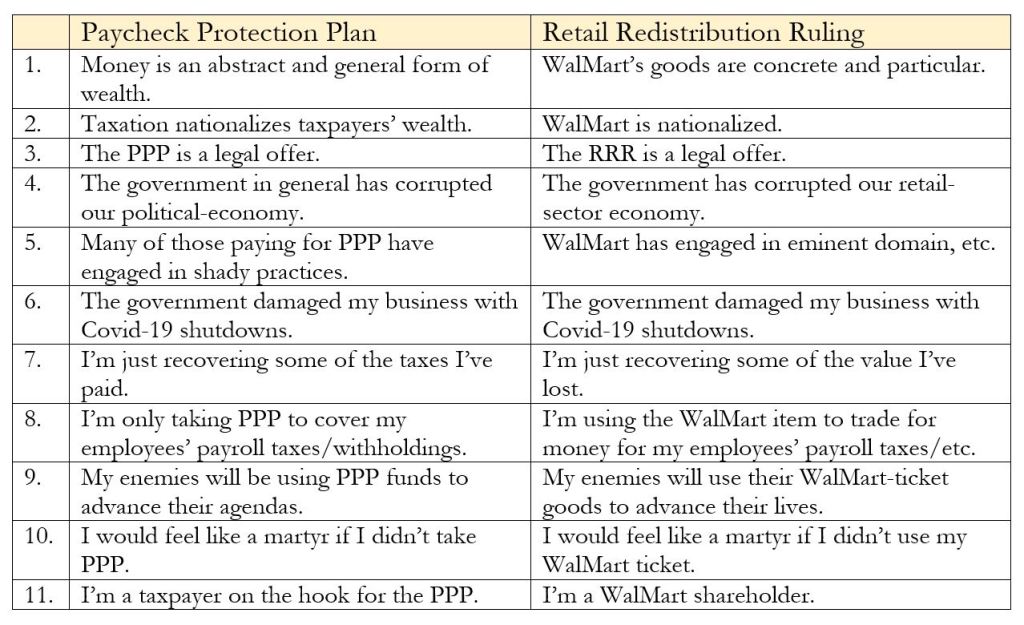Analogies clarify by making comparisons. To work well, they transfer the same structure to a more familiar domain. Often, to make general and abstract claims more easily grasped, they use particular and concrete examples.
So here’s a breakdown of my PPP/WalMart analogy previously posted.

What one needs to ask in evaluating this analogy is: Are any of them not parallel? In going from general/abstract to particular/concrete, is something important omitted or added? If not, reject those of the eleven that don’t work. If the parallels are legitimate, ask: Would I participate in RRR? If one would not, then does it follow that one should not participate in PPP?
Please note I’m not identifying any organizations in particular. That is deliberate. We’re trying to isolate principles and policies for freedom-advocating organizations in general.
(That’s also because, sadly, too often whenever particular organizations are named—name-calling begins, irrelevant histories are revisited, juvenile food fights arise, tribal loyalty is declared, and so on.)
By my count, of the eleven such freedom-oriented organizations I’ve tracked on this issue, nine have rejected PPP and two have taken PPP.
Please note also that I have not declared my final position on whether taking PPP is legitimate. The correct way to read my analyses so far is to conclude: It depends. Ethics decisions in a mixed economy are never an easy matter of mechanically and/or rationalistically applying top-down principles. Applying those principles properly depends also on the particulars of an organization’s circumstances, its unique hierarchy of values, and—as always in a corrupted economy—identifying the trade-offs it’s willing to make. Corrupted mixed systems make it virtually impossible to remain clean and whole.
All of that said, of the two organizations whose internal deliberations I’ve been privy to, I think they made the right decision.
Of the organizations that have decidedly differently, my from-the-outside view is: I don’t have the necessary particular information internal to that organization to say for sure, though I think they have a considerable burden of proof to their donors and intended audience. So far, I’m underwhelmed by the public arguments they’ve offered, which are mostly fine at identifying some of the principles involved (though none of the particularizing information) but also rely too much on Look-at-me-on-my-high-horse rhetoric.
This is clearly an important issue for such organizations to deliberate and learn from. It is, as we professors like to say, a teachable moment. So let’s all strive to be good teachers and learners.
Here’s the table again.

[Update: My follow-up Open College podcast on the morality of accepting taxpayer/government support.]
The problem I see with the analogy is that the takeover of Walmart portion is not analogous to what is happening.
What’s happening is Walmart management and nearly all of it’s shareholders agree strongly that there should be a free hot dog day for these groups. Should the groups participate in free hot dog day? Walmart management and its shareholders are pleading with them to participate The only part of free hot dog day they disagree with is that more hot dogs should be given away. Of course maybe you shouldn’t make a living off a free hot dog day but I don’t think it’s a big moral dilemma to stop by and get one if convenient and has no strings attached.